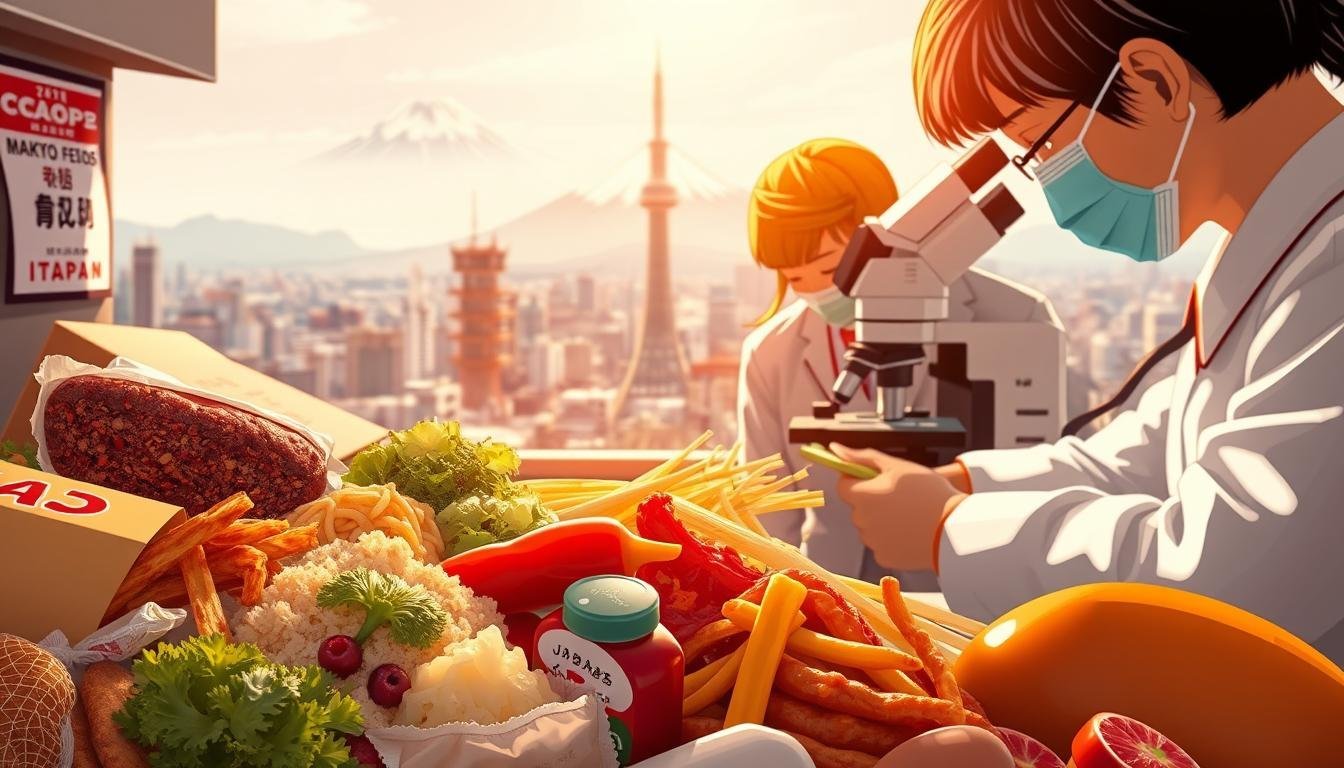You might be surprised to learn that Japan has some of the strictest food safety regulations in the world. This means certain fast food additives banned in other countries are not allowed here. But why do they make these choices, and what does it mean for us?
Learning about Japan’s rules on food additives can teach us about healthier eating. Their strict food safety standards are interesting, especially for those who love food culture and policies.
Exploring this topic will reveal the key factors behind Japan’s food safety regulations. You’ll see how these rules affect the food industry. This knowledge helps you choose better food for yourself.
Contents
- 1 The Japanese Approach to Food Safety
- 2 Common Fast Food Additives Banned in Japan
- 3 Reasons Fast Food Additives Are Banned in Japan
- 4 Regulatory Differences: Japan vs. United States
- 5 What This Means for Your Diet
- 6 Conclusion
- 7 FAQ
- 7.1 What are the most common fast food additives banned in Japan?
- 7.2 Why does Japan ban certain fast food additives?
- 7.3 How do Japan’s food safety regulations compare to those in the United States?
- 7.4 What impact do Japan’s food additive bans have on fast food chains?
- 7.5 How can consumers make informed choices about their diet based on Japan’s food safety regulations?
- 7.6 Are the food additives banned in Japan also banned in other countries?
- 7.7 How can I find out if a specific food product contains additives banned in Japan?
The Japanese Approach to Food Safety
In Japan, making sure food additives are safe is a big deal. The country has a strong food safety system. It includes strict testing and checks to make sure additives are safe.
The Food Safety Basic Law is key to Japan’s food safety rules. It sets out how to keep food safe, including the use of additives. This law makes sure additives are checked well before they can be used.
- Risk assessment: Evaluating the potential health risks associated with each food additive.
- Regulatory decision-making: Based on the risk assessment, decisions are made regarding the approval and conditions of use for each additive.
- Monitoring: Continuous monitoring of food additives to ensure compliance with safety standards.
Let’s look at how food additives are handled differently in Japan and the US:
| Additive | Status in Japan | Status in the US |
|---|---|---|
| Artificial Coloring | Banned | Approved |
| Preservative X | Restricted | Approved |
| Flavor Enhancer Y | Approved | Banned |
Japan’s careful handling of food additives sets a high bar for food safety. It also shapes global food safety standards and what consumers expect.
Common Fast Food Additives Banned in Japan
Japan has banned many fast food additives found in other countries. Their strict food safety rules have made this possible. This has led to the ban of several substances in fast food.
Artificial coloring agents, preservatives, and flavor enhancers are among the banned additives. For example, Red 3, used in candies and cereals, is banned due to health concerns.
These bans have a big impact on fast food chains. They must change their recipes to meet Japan’s rules. This means different foods for different places.
Impact on Fast Food Chains
Fast food chains have had to change for Japan’s strict rules. They now make special menu items for Japan. This is to meet local food safety standards.
| Additive | Use | Status in Japan |
|---|---|---|
| Red 3 | Food coloring | Banned |
| BHA | Preservative | Banned |
| Potassium Bromate | Bread improver | Banned |
These changes affect how fast food is made and what people think about it. In Japan, people trust fast food more because of the strict rules.
Reasons Fast Food Additives Are Banned in Japan
Japan has taken big steps to protect people from harmful fast food additives. They understand the dangers these additives can pose to health. This knowledge guides their food safety rules.
These additives can cause serious health problems. Some might even lead to cancer. Others can mess with hormones or trigger allergies. Japan bans these additives to keep its people safe.
Here are the main reasons Japan bans certain fast food additives. The table below shows the health risks and the additives involved.
| Health Concern | Additive | Reason for Ban |
|---|---|---|
| Carcinogenic Potential | Certain artificial coloring | Linked to increased cancer risk in animal studies |
| Endocrine Disruption | BHA and BHT | May interfere with hormone regulation |
| Allergic Reactions | Certain preservatives | Can cause severe reactions in sensitive individuals |
Japan bans these additives to lower health risks from fast food. Their strict food safety rules are a lesson for others. It shows the importance of careful food regulation.
The implications of these findings are significant for consumers worldwide. As more people learn about food safety, they look for healthier options. They want to avoid additives that could harm their health.
Regulatory Differences: Japan vs. United States
The rules for food additives are quite different in Japan and the US. It’s interesting to see how food safety laws vary between these two countries.
In Japan, food additives are closely watched to ensure they are safe and of good quality. The Japanese government has banned some additives used in the US. This includes certain artificial colors and preservatives due to health worries.

The way new additives are approved is another big difference. In Japan, the Ministry of Health, Labour and Welfare (MHLW) checks the safety of additives before they are allowed. The US FDA has its own rules and process for approving additives.
Comparison of Food Additive Regulations
| Regulatory Aspect | Japan | United States |
|---|---|---|
| Approval Process | Strict evaluation by MHLW | FDA approval with different criteria |
| Artificial Coloring Agents | Banned or restricted | Allowed in certain products |
| Preservatives | Strictly regulated | Used in various food products |
Knowing about these differences helps you make better choices about what you eat. It’s important to understand how countries regulate food additives.
The way Japan and the US handle food safety shows their different views and science. Both countries want safe food, but they go about it in their own ways.
Being informed about these differences helps you pick safer food options. You can choose products that fit your values and preferences.
What This Means for Your Diet
Japan’s ban on certain fast food additives is a big lesson for us. It shows how to pick safer foods. This is true whether you eat fast food or cook at home.
Japan’s food rules teach us to watch what’s in our food. Here are some tips for better choices:
- Read food labels carefully to identify additives and preservatives.
- Opt for whole foods over processed foods whenever possible.
- Choose products from manufacturers that adhere to stricter safety standards.
Let’s look at some fast food items and their additives:
| Fast Food Item | Additives Commonly Found | Japan’s Stance |
|---|---|---|
| Burgers | Preservatives like Sodium Nitrite | Banned or Restricted |
| Fried Chicken | Artificial Colors, Flavors | Strict Regulations |
| Soft Drinks | Artificial Sweeteners | Regulated |
Knowing about these additives helps you make better food choices. Choosing organic or natural foods cuts down on unwanted additives.
Eating more whole foods is also good. It avoids harmful additives and boosts your health. It’s about making choices that are good for you in the long run.
In short, Japan’s strict food rules are a great guide for healthier eating. Being informed and picking safer options can greatly improve your health.
Conclusion
Learning about Japan’s food safety rules and banned additives can change how you eat. Japan’s strict rules mean some fast food additives are not allowed. This shows the dangers of these substances.
Japan’s food safety rules are detailed and strict. They help keep food safe for everyone. Knowing what’s in your food is key to making smart diet choices.
With this knowledge, you can pick better food and understand food safety laws. Being aware of additives helps you eat healthier. It’s a step towards a better diet.
FAQ
What are the most common fast food additives banned in Japan?
In Japan, banned fast food additives include artificial colors, preservatives like BHA and BHT, and some sweeteners.
Why does Japan ban certain fast food additives?
Japan bans these additives because of health concerns. They might cause cancer, allergic reactions, or other health problems.
How do Japan’s food safety regulations compare to those in the United States?
Japan’s food safety rules are stricter than the U.S.’s. They focus more on testing and evaluating food additives.
What impact do Japan’s food additive bans have on fast food chains?
These bans force fast food chains to change their recipes. They must adapt to avoid being banned from Japan.
How can consumers make informed choices about their diet based on Japan’s food safety regulations?
To make smart choices, read food labels well. Choose items with fewer, natural ingredients. Be aware of additives’ health risks.
Are the food additives banned in Japan also banned in other countries?
Some banned in Japan are also restricted elsewhere. But, rules differ worldwide. Some countries allow certain additives.
How can I find out if a specific food product contains additives banned in Japan?
Check the ingredient list on the packaging. Or, contact the manufacturer to ask about specific ingredients and Japanese regulations.

Marcellus Stark is an investigative journalist from San Francisco, USA. He writes about global bans, rules, and unusual laws. He shares clear, interesting, and well-researched stories that help readers understand surprising facts worldwide.

